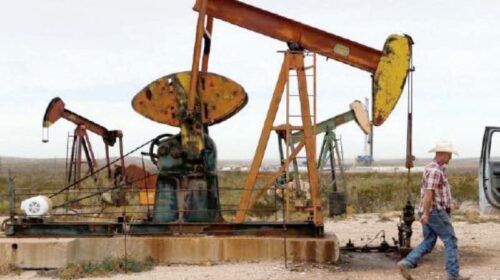Economic weakness caused by global reserve banks’ tightening and high winter heating bills will bring oil to $50 per barrel. But it won’t stay there for long.
With the price of crude oil currently hovering around $75 to $80 per barrel, many pundits believe $100 oil is right around the corner. History, however, doesn’t support such a view. After large oil price shocks like the one that came in the first half of this year with Russia’s invasion of Ukraine, the price of oil tends to fall substantially over the next one to two years.
Dramatic increases in the price of oil tend to shock the economy by suddenly and unexpectedly draining money away from businesses and consumers. Energy is a necessity, and increased spending on non-discretionary items like energy tends to dampen demand for more discretionary purchases later. High prices also tend to stimulate more production, and higher supply combined with weakening demand more often than not results in lower prices. This is the root cause of most commodity cycles: high prices get rid of high prices by reducing discretionary demand and increasing supply.
Right now, in addition to this natural commodity cycle phenomenon, there is the massive monetary policy shift from loose money to tight money occurring globally,
Intentionally balancing oil supply with demand is really difficult to do in a free market economy where prices are what naturally correct supply/demand imbalances over time. That said, the non-free market parts of the oil market are certainly trying to do their part. President Biden released oil from the Strategic Petroleum Reserve to increase supply and dampen prices in the post-Ukraine invasion oil price spike.
Conversely, OPEC cut production in anticipation of a looming economic contraction, and Russia is now threatening to join the cuts in response to sanctions levied against it for the Ukraine war, but neither of these two cuts, whether real or perceived, will likely compensate from the demand destruction caused by central banks and high winter heating bills. That’s why $50 per barrel oil will most likely come before $100 oil. which is an almost surefire recipe for economic contraction.
However, cycles are called cycles for a reason, and when the price of crude oil does get down to $50 or less, demand will pick back up and prices will move higher once again. Over time, Russia will be forced to cut its oil production because western sanctions will deplete it of the technology and expertise needed to maintain its oil production at current levels. China will eventually awaken from its COVID and real estate induced economic slowdown. And who knows, the U.S. may even be smart enough to replenish the SPR with less expensive barrels than it sold.
All of this will combine to keep the natural high and low price cycles historically found in oil and most other commodity markets intact.





